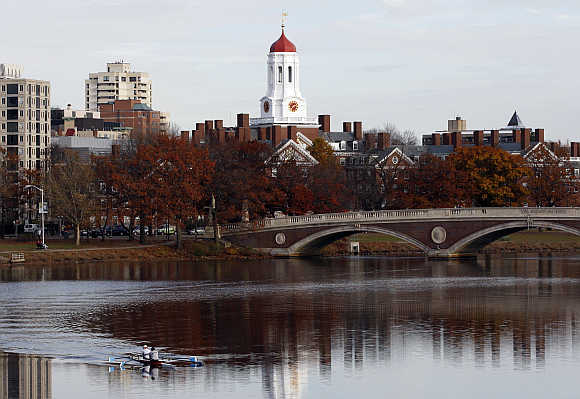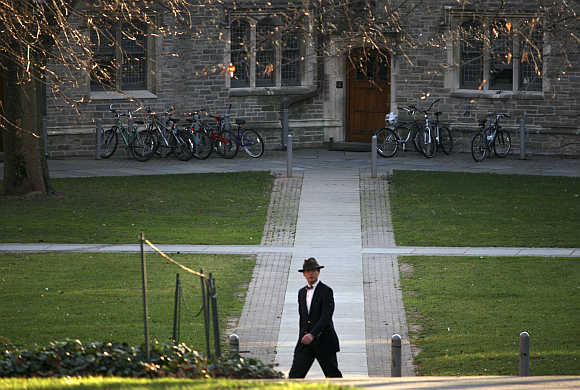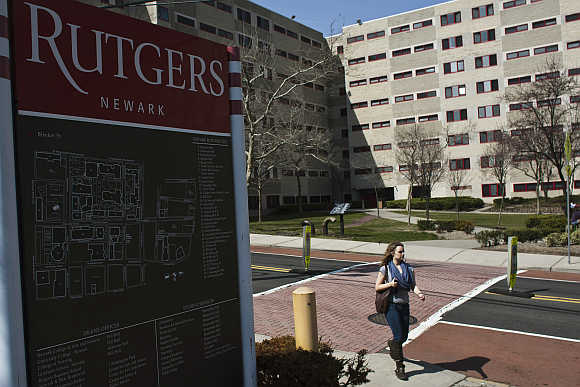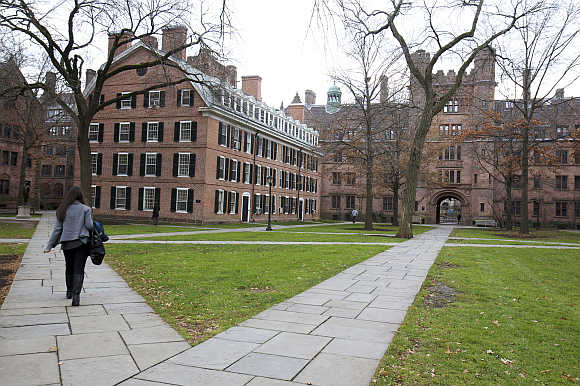 | « Back to article | Print this article |
Planning to study abroad? Tackle the rupee fall first
Arun Jacob, a foreign education expert, is very busy these days addressing students’ concerns over the depreciating rupee. For many, this means a sudden increase in fee by Rs 3-4 lakh. Hence the panic. A course at Oxford University, including tuition fee and accommodation, now costs up to Rs 31 lakh, compared with around Rs 27 lakh earlier, say experts.
In the UK, most courses cost anywhere between £12,000 and £18,000 a year and an MBA (with work experience) costs £30,000 to £35,000. US universities charge $23,000 to $40,000 for a course such as MS, while an MBA costs up to $50,000.
Click NEXT to read more...
Planning to study abroad? Tackle the rupee fall first
According to Jacob, the currency fluctuation is a part of the game and, hence, you should take it in your stride. However, many have deferred their plans, he says. More so because this time it might not be a temporary phenomenon.
Experts believe the rupee may remain in and around 58-60 a dollar level till the 2014 elections. Since the beginning of 2013, the rupee has fallen 9.5 per cent (on December 31, 2012, the rupee stood at 55 to a dollar). In the past two months, it has depreciated 12 per cent (on April 30, it stood at 53.81 per dollar).
Click NEXT to read more...
Planning to study abroad? Tackle the rupee fall first
For many, fees might not be the immediate worry as most institutes allow paying the fee term- or semester-wise. However, accommodation charges might have to be paid upfront, which will turn out to be very expensive.
Typically, monthly expenses in the US cost anywhere between $500 and $700. On December 31, 2012, students had to spend Rs 27,500-38,500 for a year. On April 30, 2013, they were paying Rs 26,905 to 37,667. Today, the student will pay Rs 30,000 to 42,000. Of course, already there may not feel the pinch so much. Parents send a fixed amount, which hasn’t changed.
Click NEXT to read more...
Planning to study abroad? Tackle the rupee fall first
Needless to say, the impact varies according to where a student is situated. Tuition fees in most leading universities are roughly the same. Travel and miscellaneous expenses form a large part of your expenditure as most students cook food themselves.
Although there is little you can do if you cannot avoid going for studies, here are a few ways to handle the rupee fall: “Some institutes allow paying the entire tuition fee upfront. This helps you avoid heartburns due to exchange rate fluctuations. So if you can, pay in advance,” suggests Ashish Mirajgaonkar, partner at Aurangabad’s education consultancy, Vishwashri Consultancy.
Click NEXT to read more...
Planning to study abroad? Tackle the rupee fall first
If you feel it is a temporary phenomenon, you could pay term-wise at different exchange rates. However, the currency can always depreciate further. “Institutes in the UK give around five per cent discount for paying the entire fee in one go. However, for those who have taken a loan, this discount would mean little, as they repay the loan at 12-13 per cent in India,” adds Mirajgaonkar.
Those dependent on a loan are impacted the most. Finding a job might not be easy as most countries are seeing a slowdown. The other problem is while institutes in the US allow you to pay on reaching there, the UK asks for either the first installment or a caution deposit or full fee, even before the visa is confirmed.
Click NEXT to read more...
Planning to study abroad? Tackle the rupee fall first
So, those going to the US should pay only once the visa is confirmed. Also, buying dollars in advance does not make sense as banks sell dollars at a higher cost but buy it back at a much lower cost, Mirajgaonkar cautions.
If you have a relative abroad, especially in the US, you can borrow from a bank there. This helps because the rate of interest on education loan there is only three to four per cent a year. For this, however, your relative or friend living there will need to stand guarantor. S/he will need to furnish dollar assets equal to the loan amount.
Click NEXT to read more...
Planning to study abroad? Tackle the rupee fall first
It might be preferred if the relative or friend is a Green Card holder. However, only about five per cent of students seem to have relatives abroad, says Jacob. If you approach an Indian bank’s foreign branch for a loan, you might be asked to borrow from a branch in India, according to experts.
“We also advise students, who can, to take a personal loan from their relative or friend abroad. Given the money borrowed will be in the foreign currency, it will mitigate fluctuation risk,” says Naveen Chopra, chairman of education consultancy firm The Chopras.
Click NEXT to read more...
Planning to study abroad? Tackle the rupee fall first
And relatives may not charge interest on the loan. If you have taken exams for multiple countries, you could consider those where the currency difference is less compared to the rupee.
For instance, choosing the US over the UK. “You can’t take forward cover in such situations. At the same time, parents should not stress their budgets or mortgage homes to fund their child’s education,” says Chopra.
Every year, there are some students who cannot go due to fund crunch. Such students postpone their plans for the next year, for they believe they can collect the funds. But this time, such students have landed in a soup. “They have no choice but to postpone their plans further,” adds Chopra.
Click NEXT to read more...
Planning to study abroad? Tackle the rupee fall first
Students can opt for universities offering scholarships, which will also help reduce the fund requirement. At the same time, scholarships are not easily given by the foreign universities.
Assistantship are an option, but there could be a lot of competition. Most countries allow students to work up to 20 hours a month. One can take up part-time jobs, keeping in mind the rules one should comply with.









